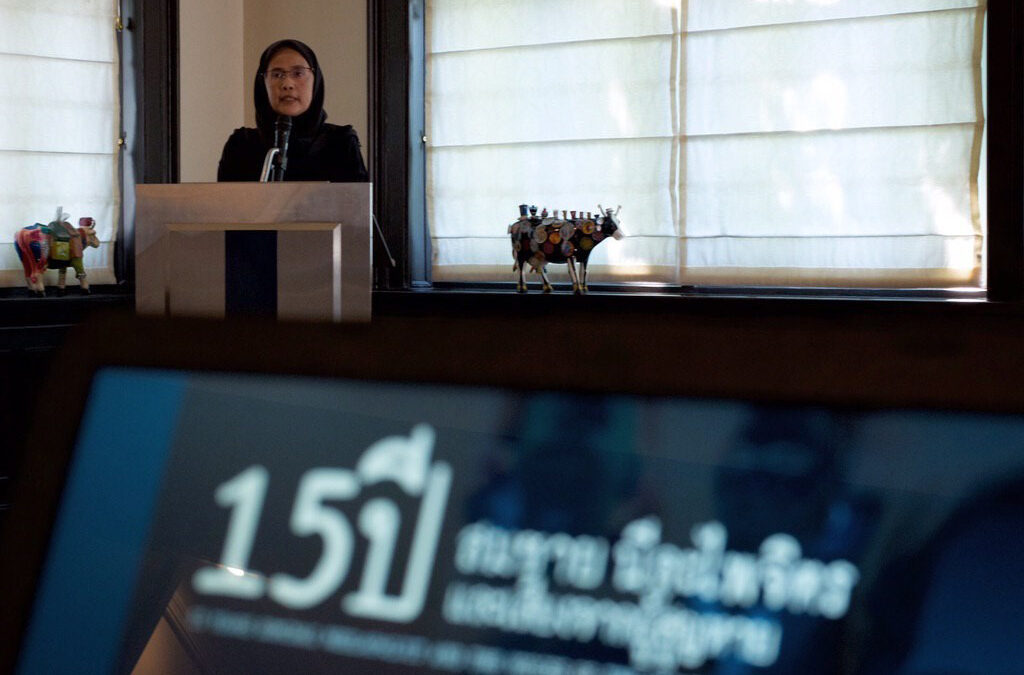
Mar 12, 2019 | News
Today, the ICJ co-hosted an art exhibition and public forum titled 15th Year of Somchai’s Disappearance and the Voices of the Disappeared at the Embassy of the Netherlands in Bangkok.
The event was held to commemorate 15 years since the enforced disappearance of Somchai Neelapaijit, a prominent human rights lawyer, whose case has never been adequately by the Thai authorities.
Somchai was abducted after being stopped on a road in Bangkok on 12 March 2004 and taken from his car by a group of police officers. He has not been seen since. Fifteen years after his disappearance, Somchai’s fate and whereabouts remain unknown and no one has been held accountable for the crime against him.
More than 100 participants attended the event, including family victims of alleged disappearance cases, students, lawyers, members of civil society, diplomats, and members of the Thai authorities and media.
Opening remarks were delivered by Angkhana Neelapaijit, wife of Somchai Neelapaijit, and Kenza Tarqaât, First Secretary of the Embassy of the Netherlands in Bangkok.
The opening session included remarks by the victims who spoke about their challenges and about the progress and development regarding investigations into the alleged disappearance cases of their relatives. The session included the following speakers:
Sanhawan Srisod, the ICJ’s National Legal Adviser, spoke during the second session on recent amendments to the Draft Prevention and Suppression of Torture and Enforced Disappearance Act.
She highlighted concerns that the recent amendments would, if adopted, fail to bring the law into full compliance with Thailand’s international human rights obligations.
Sanhawan further expressed concern that the fate of the Draft Act was uncertain as Thailand’s National Legislative Assembly (NLA) that is considering the bill, while it may also continue their work in case of the necessity, will stop considering laws on 15 March, prior to the scheduled elections of 24 March 2019.
She stressed that it is crucial the Thai Government continues to consider and amend the bill, and pass it without delay in line with Thailand’s international human rights obligations.
The panel was moderated by Chanatip Tatiyakaroonwong from Cross-Cultural Foundation and also included the following panelists:
- Nongporn Roongpetchwong, Human Rights Expert, Rights and Liberties Protection Department, Ministry of Justice
- Badar Farrukh, Thailand Team Leader, United Nations’ Office of the High Commissioner for Human Rights (OHCHR) Regional Office for South East Asia
Closing remarks was delivered by Pratubjit Neelapaijit, daughter of Somchai Neelapaijit.
The forum was co-organized with the Neelapaijit family, Amnesty International – Thailand, Cross Cultural Foundation (CrCF), the Embassy of the Netherlands in Bangkok, Human Rights Lawyers’ Association and the United Nations’ Office of the High Commissioner for Human Rights (OHCHR) Regional Office for South East Asia.
Read Also:
Thailand-Summary ICJ analysis Draft Act-Advocacy-2019-ENG (Summary of the ICJ analysis of the Draft Act, in PDF)
Ten Years Without Truth: Somchai Neelapaijit and Enforced Disappearances in Thailand
Missed Opportunities: Recommendations for Investigating the Disappearance of Sombath Somphone
Thailand: ICJ submits recommendations on draft law on torture and enforced disappearance amendments
Thailand: ICJ, Amnesty advise changes to proposed legislation on torture and enforced disappearances
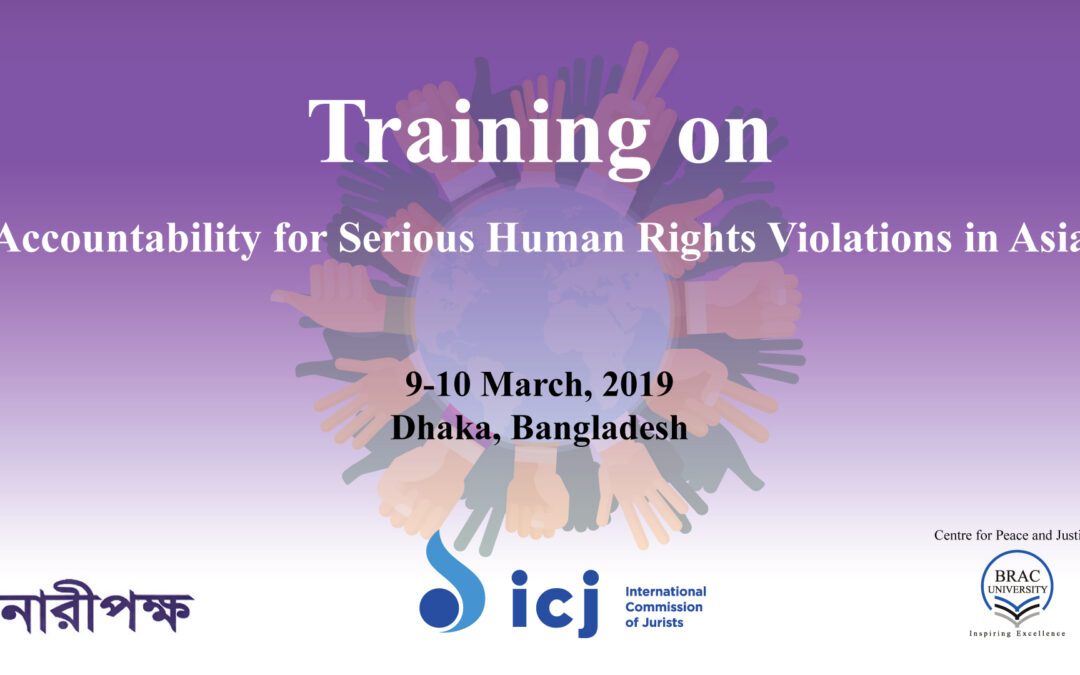
Mar 12, 2019 | Events, News
The ICJ convened a two-day workshop from 9th to 10th March 2019 in Dhaka, Bangladesh to discuss applicable international legal mechanisms designed to achieve accountability for serious human rights violations in Asia.
Bangladesh-based non-government organizations the Centre for Peace and Justice and Naripokkho co-hosted the event with the ICJ, with a representative of AJAR (Asia Justice and Rights) also joining. Twenty Bangladeshi lawyers, activists and academics attended the event.
Legal advisers from the ICJ provided an overview of the Independent Investigative Mechanism for Myanmar (IIMM), currently being established following a UN Human Rights Council resolution in September 2018.
They also discussed the structure and procedures of the International Criminal Court (ICC), whose prosecutors are currently conducting a preliminary examination into the deportation of Rohingyas from Myanmar into Bangladesh. Unlike Myanmar, Bangladesh is a State Party to the Rome Statute of the ICC, and its pre-trial chamber has indicated the Court has jurisdiction over crimes listed in the Rome Stature were one element, or part of a crime, was committed inside the territory of Bangladesh.
AJAR’s co-founder provided an overview of transitional justice processes, drawing upon international and regional experiences of truth-seeking, prosecutions, reparations and reforms to guarantee non-repetition of human rights violations.
Two of the ICJ’s legal advisers also travelled to Cox’s Bazar, Bangladesh, where they met relevant stakeholders to discuss the situation of Rohingya refugees from Myanmar, and to share information about accountability mechanisms, including about expected timelines, outcomes and limitations.
The activity is part of the ICJ’s global work on promoting accountability and redress for gross human rights violations to facilitate justice and deter repetition.
Contact: Kingsley Abbott, ICJ Senior Legal Advisor for Global Redress and Accountability e: kingsley.abbott@icj.org
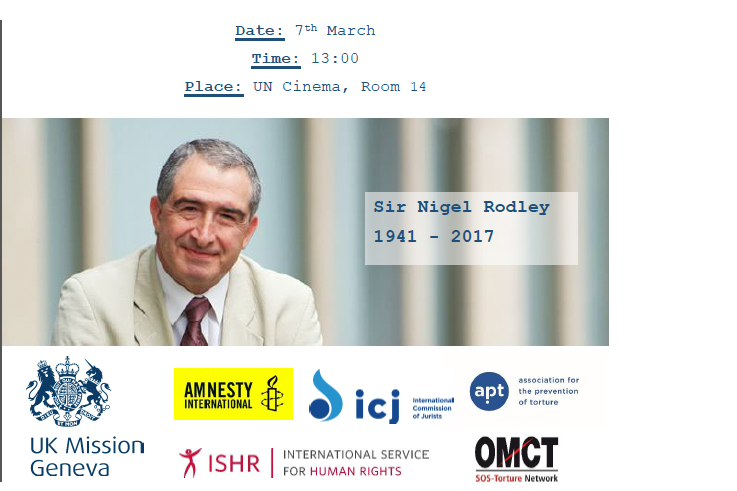
Mar 7, 2019 | Events, News
The ICJ is proud to join in presenting the documentary film The Long Haul, to be screened during the UN Human Rights Council session in Geneva.
Inspired by the life of the late Nigel Rodley—one of the principal architects of the modern human rights framework— the documentary The Long Haul addresses the current backlash on human rights and how best to respond.
Sir Nigel’s remarkable life story is an inspiration to stand up against wrongdoing and to continue fighting for equality and justice. At the same time, his family history is a reminder of the WWII tragedies that gave birth to the modern human rights regime and what could happen if we fail to honour these basic rights.
Nigel Rodley dedicated his career to the protection of those most at risk, including as Amnesty International’s first legal adviser and later as UN Special Rapporteur on Torture as then as a member and eventually Chair of the Human Rights Committee. He had a longstanding association with the ICJ as Commissioner and in other roles, and was President of the ICJ at the time he passed away.
The film will be screened at a side event to the UN Human Rights Council session, at 13h00 on Thursday 7 March, in Room XIV (UN Cinema) of the Palais des Nations in Geneva. Access is available only to those who already hold grounds passes for the UN in Geneva, or accreditation for the Council session.
The event is organised by the Permanent Mission of the United Kingdom in Geneva, with participation of the International Commission of Jurists (ICJ), Amnesty International, the World Organisation against Torture (OMCT), Association for the Prevention of Torture (APT), and International Service for Human Rights (ISHR).
For more information contact un(a)icj.org
A flyer for the event can be downloaded in PDF format here: Events-NigelRodleyFilm-2019-En
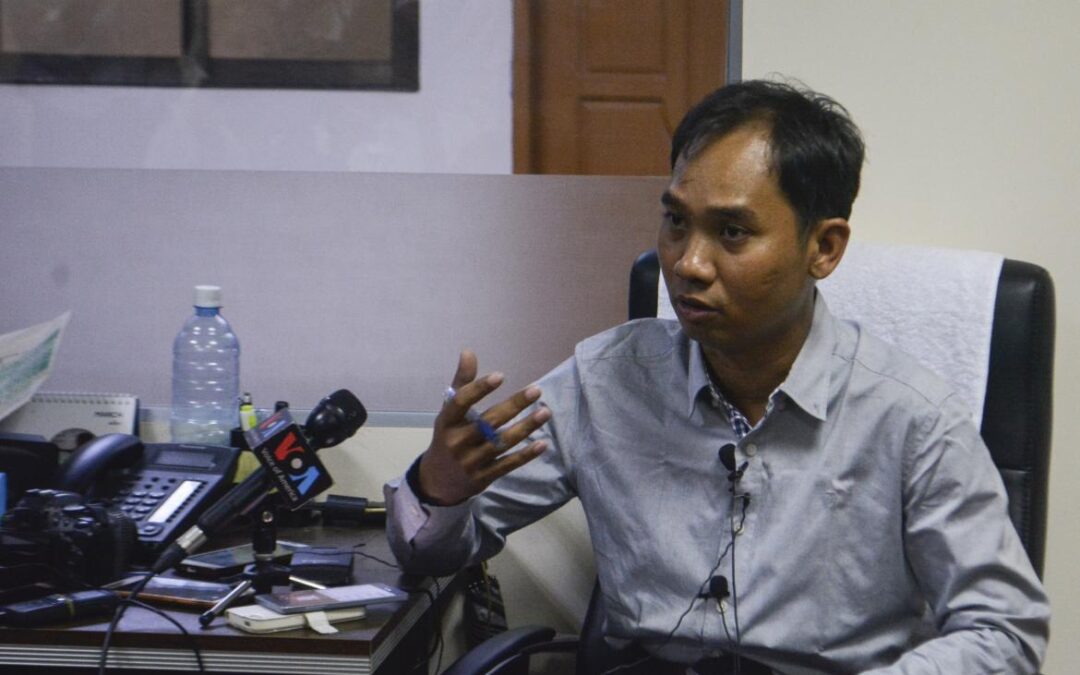
Mar 7, 2019 | Advocacy, News
The ICJ joined a list of 77 civil society organizations to call on relevant authorities in Myanmar to drop spurious charges against journalist Ko Swe Win, to decriminalize defamation, and to release human rights defenders currently imprisoned under repressive criminal defamation laws.
The statement reads:
On the second anniversary of the defamation charges brought upon Ko Swe Win, editor at online newspaper Myanmar Now, we, the undersigned 77 civil society organisations, call on the relevant authorities to drop the case against him. Spurious defamation charges under Article 66(d) of the Telecommunications Law were filed against him on 7 March 2017 by ultranationalists intent on suppressing free speech. The Government of Myanmar must take concrete steps in parliament to decriminalise defamation, repeal Article 66(d) of the Telecommunications Law and drop the charges and release all activists and human rights defenders currently in prison and being charged under this repressive legislation.
Article 66(d) of the Telecommunications Law of 2013 was amended in 2017, but notably, defamation is still criminalised and carries a punishment of up to two years of imprisonment or a fine of up to one million kyat or both. The law is still frequently used to stifle free speech in Myanmar and silence critics. To date, a reported 173 cases have been filed under Article 66(d) since its enactment.
The UN Human Rights Committee has called on all states to decriminalise defamation, indicating that imprisonment for defamation is a penalty that can never be appropriate or compatible with the right to freedom of expression. In addition, the Special Rapporteur on the promotion and protection of the right to freedom of opinion and expression has stated that defamation should be treated as a matter of civil rather than criminal law, stressing that criminal prosecution for defamation inevitably becomes a mechanism of political censorship, which contradicts freedom of expression and of the press. In the case of Article 66(d), Myanmar law allows for agents of the offended party to file charges for defamation and initiate criminal proceedings on their behalf. In effect, this means that powerful organisations and individuals can operate via proxies to target those that they consider disturbing, a form of judicial harassment with severe implications for the individuals who are accused.
Ko Swe Win was charged with defamation under Article 66(d) of the Telecommunications Law for sharing a story by Myanmar Now on Facebook. The story quoted a senior monk who said that well-known ultranationalist monk U Wirathu’s actions could be cause for him to be expelled from the monkhood as they violated the tenets of Buddhism. U Wirathu, notorious for using Facebook to agitate against Muslims, had previously expressed support for and thanked U Kyi Lin – the recently convicted gunman who shot and killed prominent lawyer U Ko Ni in January 2017. U Ko Ni was an expert on constitutional law and was working to change the military-drafted 2008 Constitution. The plaintiff, a follower of U Wirathu, brought the charges in March 2017 and the court proceedings started in July 2017.
Since then, Ko Swe Win has had to travel regularly to the courthouse in Mandalay, where the charge was filed, from his home in Yangon and back – a distance of over 1,200 kilometres. The court hearings, now totaling 55, have been ongoing for almost two years, but the court has still only heard the plaintiff’s side, which has consistently been stalling the process. On some occasions, Ko Swe Win has travelled from Yangon only to find that the plaintiff or witnesses have failed to appear in court and that the proceedings have been postponed. The plaintiff himself was arrested in August 2017 and has since been detained, which has caused significant delays to the process.
U Wirathu has been summoned twice but failed to appear. On the first occasion, his lawyer informed the court that U Wirathu could not make the hearing because he was attending a donation ceremony. On the second occasion, U Wirathu’s lawyer requested that the hearing be held at his monastery compound. That request was denied by the township court, but U Wirathu appealed to the higher district court, which also denied the request. While the district court considered the request, no hearings could be held in the township court. Ko Swe Win however, was still required to make an appearance every two weeks before the township court judge just to be informed of the next date he was due to appear in court. This procedure, which required him to travel from Yangon to Mandalay, was typically over in a matter of minutes.
The many irregularities of this case highlight the lack of independence of the Myanmar judiciary. It appears that the authorities are determined to target those that are working to expose troubling truths and terrible crimes, rather than those who commit them. Those responsible for spreading dangerous speech and inciting violence face no consequences, while those who criticise such dangerous actions continue to be prosecuted. In a recent parallel case, also fraught with controversies, two Reuters reporters – Wa Lone and Kyaw Soe Oo – were convicted to seven years in prison for exposing a mass killing of Rohingya men and boys carried out by the Myanmar military in northern Rakhine State.
In Myanmar, high-ranking military commanders, some of whom are accused by UN investigators for war crimes, crimes against humanity, and even genocide, remain at large, while journalists who expose the truth and report on human rights violations in the country are charged under repressive laws. This inverted idea of justice needs to come to an end if Myanmar is to continue its path towards democracy.
As long as Article 66(d) remains, people in Myanmar, especially those who criticise powerful individuals, officials and government policies online, will be at risk of being imprisoned for their peaceful exercise of the right to freedom of expression.
In light of the above, we call on the Government of Myanmar and its relevant authorities to:
- Drop the defamation charges under Article 66(d) of the Telecommunications Law against Ko Swe Win and other activists and human rights defenders and release those currently imprisoned under this repressive legislation;
- Repeal Article 66(d) of the Telecommunications Law, or at a very minimum, amend it to ensure that:
- defamation is no longer criminalised by deleting references to “defamation” as well as vague language such as “disturbing”;
- only a government prosecutor can file a criminal complaint under Article 66(d);
- where recognisably criminal acts such as “extortion” and “threats” occur in the law they are clearly and narrowly defined in line with international human rights law, to ensure it is not used to criminalise the peaceful expression of views.
Download
Myanmar-statement on defamation-Advocacy-2019-ENG (full statement in English, PDF)
Myanmar-statement on defamation-Advocacy-2019-BUR (full statement in Burmese, PDF)
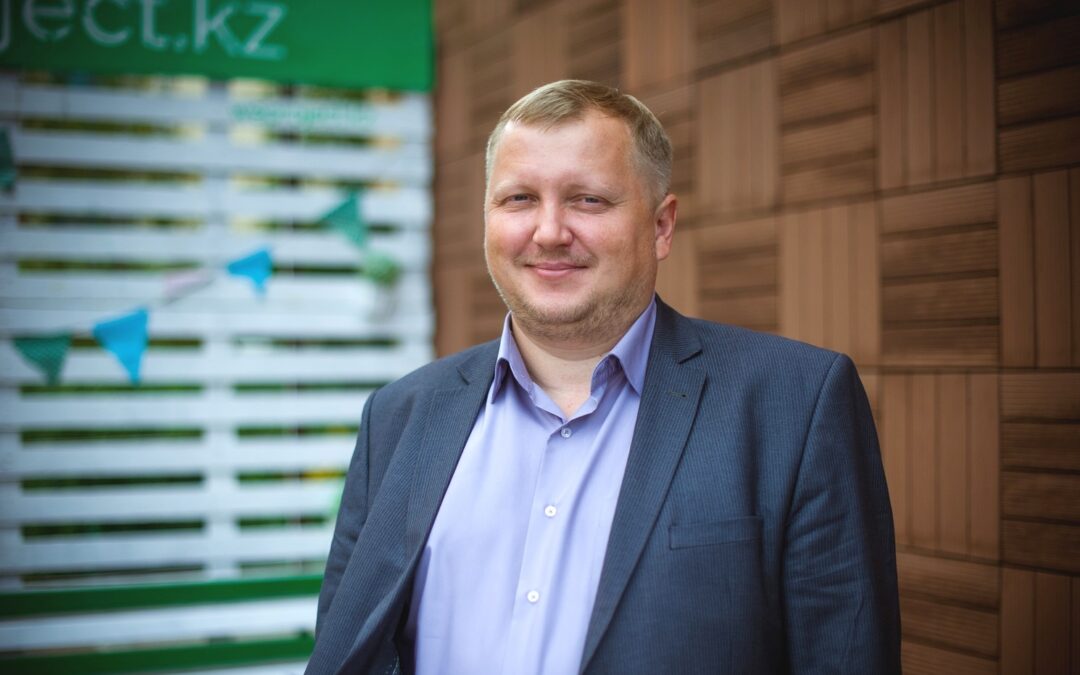
Mar 6, 2019 | News
Today, the ICJ expressed concern at the initiation of disbarment proceedings by the Ministry of Justice of Kazakhstan against Sergey Sizintsev, former Executive Director of the National Bar Association and the newly-elected head of the Scientific-Consultative Board of the National Bar Association.
The official ground for disbarment of Sizintsev is his work as the Director the National Bar Association in 2016-2018 while continuing his legal practice at the same time.
On his facebook public account, however, Sizintsev alleged that this initiative is not related to the officially stated grounds, and that in fact continuing to practice while working as Director of the Bar Association is clearly permitted by the Kazakhstan’s law. Rather, he alleges, he is being pursued for his criticism of the law “On lawyers’ activity and legal aid” as well as his public statements in different international and national fora in regard to issues related to the independence of the legal profession.
The ICJ recalls that freedom of expression and association, in particular, constitute essential requirements for the proper and independent functioning of the legal profession and must be guaranteed by law and in practice.
According to Principle 23 of the UN Basic Principles on the Role of Lawyers, lawyers “[…] have the right to take part in public discussion of matters concerning the law, the administration of justice and the promotion and protection of human rights and to join or form local, national or international organizations and attend their meetings, without suffering professional restrictions by reason of their lawful action or their membership in a lawful organization. In exercising these rights, lawyers shall always conduct themselves in accordance with the law and the recognized standards and ethics of the legal profession.”
Sergey Sizintsev as Executive Director of the National Bar Association and as a member of the Parliament working group on the Law on Lawyers’ Activities, was expected to voice concerns of members of the legal position including on the new law which the legal profession consider to be restrictive.
Moreover, his position demanded that he expresses his position on behalf of the National Bar Association including to draw attention to legislative developments which can jeopardise the independence of the legal profession in Kazakhstan.
The ICJ is concerned that this initiative appears to constitute an attack on the independence of lawyers in Kazakhstan and may have a chilling effect on members of the legal profession.
The ICJ therefore calls on the Ministry of Justice to end this lawsuit immediately.
The ICJ will closely follow the case of Sergei Sizintsev and the proceedings at the Rayon Court in Petropavlovsk.
In December 2017, the ICJ organized a mission to Kazakhstan and raised concerns over the then planned reform.
In November 2018, the ICJ raised concern at the disbarment proceedings against Presidents of Aktybinsk and Pavlodar Bar Association as well as resignation of Anuar Tugel, the President of the National Bar Association of Kazakhstan, allegedly as a result of the pressure from the Ministry of Justice.
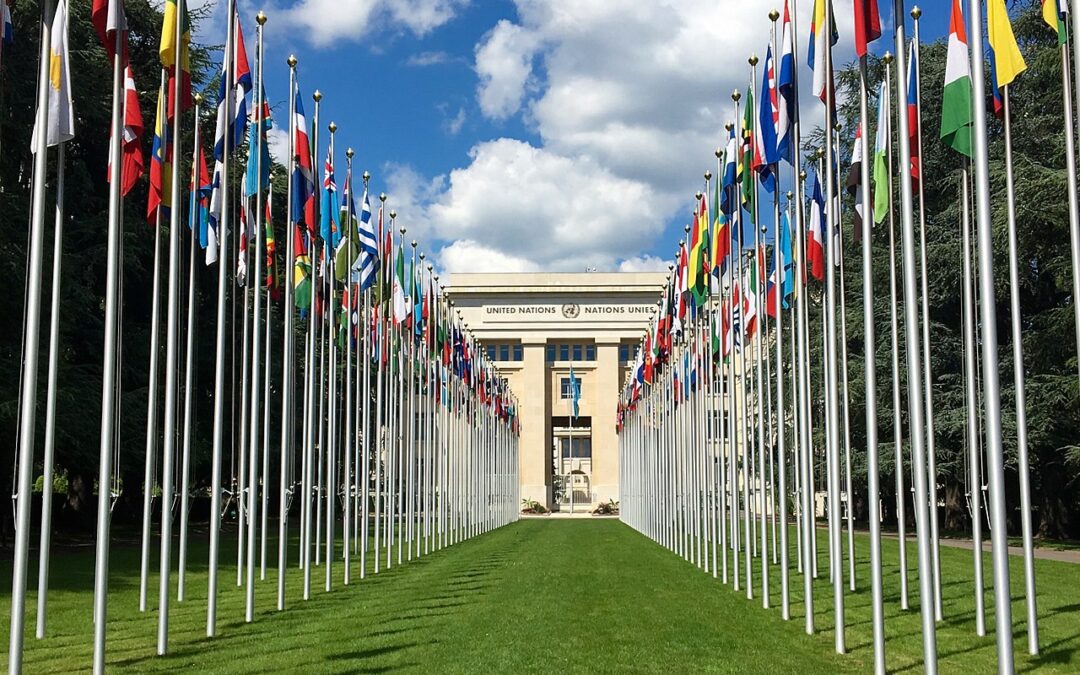
Mar 5, 2019 | News
States at the United Nations Human Rights Council in Geneva should ensure that Egypt is not allowed to seize a leading role in relation to the mandate of the United Nations’ expert on human rights and counter-terrorism, nine international human rights organizations, including the ICJ, have said.
In light of Egypt’s record of severe and widespread abuse of counter-terrorism measures to violate human rights, the organizations warned against attempts by Egypt to undermine the expert’s mandate.
The mandate of the UN Special Rapporteur on the promotion and protection of human rights and fundamental freedoms while countering terrorism is due to be renewed in the coming weeks at the ongoing Human Rights Council session in Geneva.
Mexico has for many years led the resolution that established and maintained the expert, but is understood now to be in discussions with Egypt about a possible leadership role for Egypt.
Other changes to the resolution text may also be under consideration.
“Egypt has an appalling record of abusing counter-terrorism measures against human rights defenders and other dissenting voices, and was recently denounced by the UN Special Rapporteur on human rights defenders for severe reprisals against people who spoke with another visiting UN expert,” said Matt Pollard, Senior Legal Adviser and UN representative for the ICJ.
“To give such a country shared leadership on the renewal of the mandate of the UN’s expert on human rights and counter-terrorism would only do further harm to civil society and others in Egypt and elsewhere, undermine the work of the expert and the UN as a whole, and badly tarnish the long history of leadership Mexico has shown on these issues,” he added.
Nine organizations – ICJ, Amnesty International, ARTICLE 19, Cairo Institute for Human Rights Studies, CIVICUS/World Alliance for Citizen Participation, International Federation for Human Rights (FIDH), Human Rights Watch, International Service for Human Rights, and Privacy International – had earlier sent a joint letter to all countries representatives in Geneva highlighting their concerns.
This was followed by a joint oral statement at the Human Rights Council session on 1 March, during an interactive dialogue with the special rapporteur.
Egypt has gradually sought to dilute or distort the longstanding focus of the UN Human Rights Council’s work to protect and promote human rights and fundamental freedoms while countering terrorism, the groups said.
In 2018 it succeeded in watering down the council’s longstanding thematic resolution on the topic, in which states annually recognize concerns about abuses and urge respect for human rights at a global and abstract level.
However, any move to gain control over the resolution on which the mandate of the special rapporteur depends, or to dilute or reframe her mandate, would have far deeper and further-ranging damaging effects.
The special rapporteur acts on individual complaints, reports on the situation in particular countries, and addresses in detail topics relating to counterterrorism work around the world on an ongoing basis.
The special rapporteur also serves an essential function in providing independent oversight of counterterrorism measures from a human rights perspective within the overall UN system.
The mandate holds a uniquely important role in the UN counterterrorism architecture, as the only UN entity with the exclusive mandate to ensure the promotion and protection of human rights while countering terrorism.
The organizations have been urging other countries to strongly oppose any attempts to weaken the mandate of the special rapporteur.
The special rapporteur’s role should not be diluted by including the flawed Egyptian-led approach into the resolution for its renewal, or by sharing the leadership of the mandate renewal resolution with Egypt or other countries that have such an appalling record in relation to the very issues the mandate is to address, they said.
Allowing Egypt to jointly lead the mandate renewal would only serve to encourage a continuation of its pattern of gross human rights violations and abuses against civil society and others within Egypt in the name of countering terrorism, while shielding it from international scrutiny, the groups said.
It would also pose a long-term threat to the UN’s role in ensuring that counterterrorism measures are consistent with human rights, and that measures to uphold human rights for all and the rule of law are the fundamental basis for the fight against terrorism.
Contact
Matt Pollard, ICJ Senior Legal Adviser & UN Representative, t: +41 79 246 54 75 ; e: matt.pollard(a)icj.org










